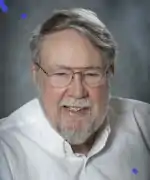Benjamin Kline Hunnicutt | |
|---|---|
 Hunnicutt in 2019 | |
| Born | |
| Spouse | Francine M. |
Benjamin Kline Hunnicutt, Sr., is a historian. He has been a professor at the University of Iowa since 1975.
For most of his academic career, he has focused his research and writing on the historical mystery: "the end of shorter hours,” asking why after over a century of steady work reductions, during which work hours were cut nearly in half, shorter hours were considered an essential part of human progress, and most people (including John Maynard Keynes) expected the process to continue, did working hours stop getting shorter and the dream of increasing free time disappear?
With writers such as Joseph Pieper and Hannah Arendt, he has also explored the “rise of the world of total work”— the unique modern glorification of work as a modern crypto-religion.
He is the author of numerous articles, book chapters, and books, including Work Without End: Abandoning Shorter Hours for the Right to Work (1987, Temple, see NY Times book review, Washington Post review); Kellogg's Six-Hour Day (1995, Temple, see NY Times book review) Free Time: The Forgotten American Dream (2013, Temple, see short review, NY Times), The Age of Experiences: Harnessing happiness to Build a New Economy (Temple, 2020, Foreword by Joe Pine).
Hunnicutt is a member of the Academy of Leisure Sciences and past co-director of the Society for the Reduction of Human Labor. Professor Hunnicutt received his MA and PhD in American History from the University of North Carolina, Chapel Hill. He has served as chair of Leisure Studies and head of the Division of Physical Education at the University of Iowa. He has worked as a consultant to unions and businesses interested in shorter work hours and the potential of leisure to improve the community and workplace.
Hunnicutt has written for The Wall Street Journal, Politico, Salon, and the Huffington Post, and appeared in a variety of nationally and internationally broadcast television and radio programs including: ABC News, NBC News, PBS, the Canadian and British Broadcasting Corporations, the Today Show, the Charlie Rose Show, and appeared in the PBS special, “Running Out of Time” and the German documentary, “Frohes Schaffen - Ein Film zur Senkung der Arbeitsmoral”.
Recent international interest in alternative work schedules (4-day, and thirty-hour weeks), has renewed and broadened interest in his work – see Salon.
See also the profile article about his scholarship and career, published by the Chronicle of Higher Education, Oct 20, 2014.[1]
Works
- Work Without End: Abandoning Shorter Hours for the Right to Work (1988)[2]
- Kellogg's Six-Hour Day (1996)[3]
- Free Time: The Forgotten American Dream (2013)[4]
- The Age of Experiences: Harnessing Happiness to Build a New Economy (2020)
References
- ↑ Harrop, Froma. "The Long, Hot Summer of Work". Nation of Change. Archived from the original on 3 June 2016. Retrieved 11 August 2014.
- ↑
- Butsch, Richard (1990). "Review of Work without End: Abandoning Shorter Hours for the Right to Work". International Labor and Working-Class History (37): 115–117. ISSN 0147-5479. JSTOR 27671878.
- Cross, Gary (1989). "Review of Work without End: Abandoning Shorter Hours for the Right to Work". The Business History Review. 63 (3): 672–674. doi:10.2307/3116050. ISSN 0007-6805. JSTOR 3116050.
- Friedman, Gerald (1989). "Review of Work without End: Abandoning Shorter Hours for the Right to Work". The Annals of the American Academy of Political and Social Science. 505: 190–192. ISSN 0002-7162. JSTOR 1047312.
- Keyssar, Alexander (1990). "Review of Work without End: Abandoning Shorter Hours for the Right to Work". The American Historical Review. 95 (2): 611–612. doi:10.2307/2163975. ISSN 0002-8762. JSTOR 2163975.
- Roediger, David (1989). "Review of Work without End: Abandoning Shorter Hours for the Right to Work". The Journal of American History. 76 (1): 290–291. doi:10.2307/1908450. ISSN 0021-8723. JSTOR 1908450.
- Whaples, Robert (1989). "Review of Work Without End: Abandoning Shorter Hours for the Right to Work". The Journal of Economic History. 49 (1): 241–243. ISSN 0022-0507. JSTOR 2121457.
- ↑
- Fones-Wolf, Elizabeth (1998). "Review of Kellogg's Six-Hour Day". International Labor and Working-Class History (54): 220–223. ISSN 0147-5479. JSTOR 27672536.
- Jacobsen, Joyce (1998). "Review of Kellogg's Six-Hour Day". The Journal of Economic History. 58 (1): 274–275. ISSN 0022-0507. JSTOR 2566299.
- Jones, Russell Douglass (1998). "Review of Kellogg's Six-Hour Day". Michigan Historical Review. 24 (1): 178–179. doi:10.2307/20173738. ISSN 0890-1686. JSTOR 20173738.
- Kazin, Michael (December 22, 1996). "Quitting Time". The New York Times. ISSN 0362-4331.
- Mutari, Ellen (1998). "Review of Kellogg's Six-Hour Day". Review of Social Economy. 56 (4): 543–546. ISSN 0034-6764. JSTOR 29769980.
- Nelson, Daniel (1997). "Review of Kellogg's Six-Hour Day". The Journal of American History. 84 (3): 1115–1116. doi:10.2307/2953199. ISSN 0021-8723. JSTOR 2953199.
- Rogers, Jackie Krasas (1997). "Review of Kellogg's Six-Hour Day". Contemporary Sociology. 26 (5): 631–632. doi:10.2307/2655663. ISSN 0094-3061. JSTOR 2655663.
- Strom, Sharon Hartman (2000). "Review of Kellogg's Six-Hour Day; Rocking the Boat: Union Women's Voices, 1915-1975". The Oral History Review. 27 (2): 193–196. ISSN 0094-0798. JSTOR 3675834.
- ↑
- Alpuerto-Abadam, Vidalina (2014). "No time to play in the USA?". Monthly Labor Review. ISSN 0098-1818. JSTOR monthlylaborrev.2014.09.017.
- McBee, Randy D. (2013). "Review of Free Time: The Forgotten American Dream". The American Historical Review. 118 (5): 1563–1564. ISSN 0002-8762. JSTOR 23784675.
- McCrossen, Alexis Macon (2014). "Review of Free Time: The Forgotten American Dream". The Journal of American History. 100 (4): 1176–1177. ISSN 0021-8723. JSTOR 44307866.
- Ramey, Valerie A. (2013). "Review of Free Time: The Forgotten American Dream". The Journal of Economic History. 73 (4): 1190–1191. ISSN 0022-0507. JSTOR 24551029.